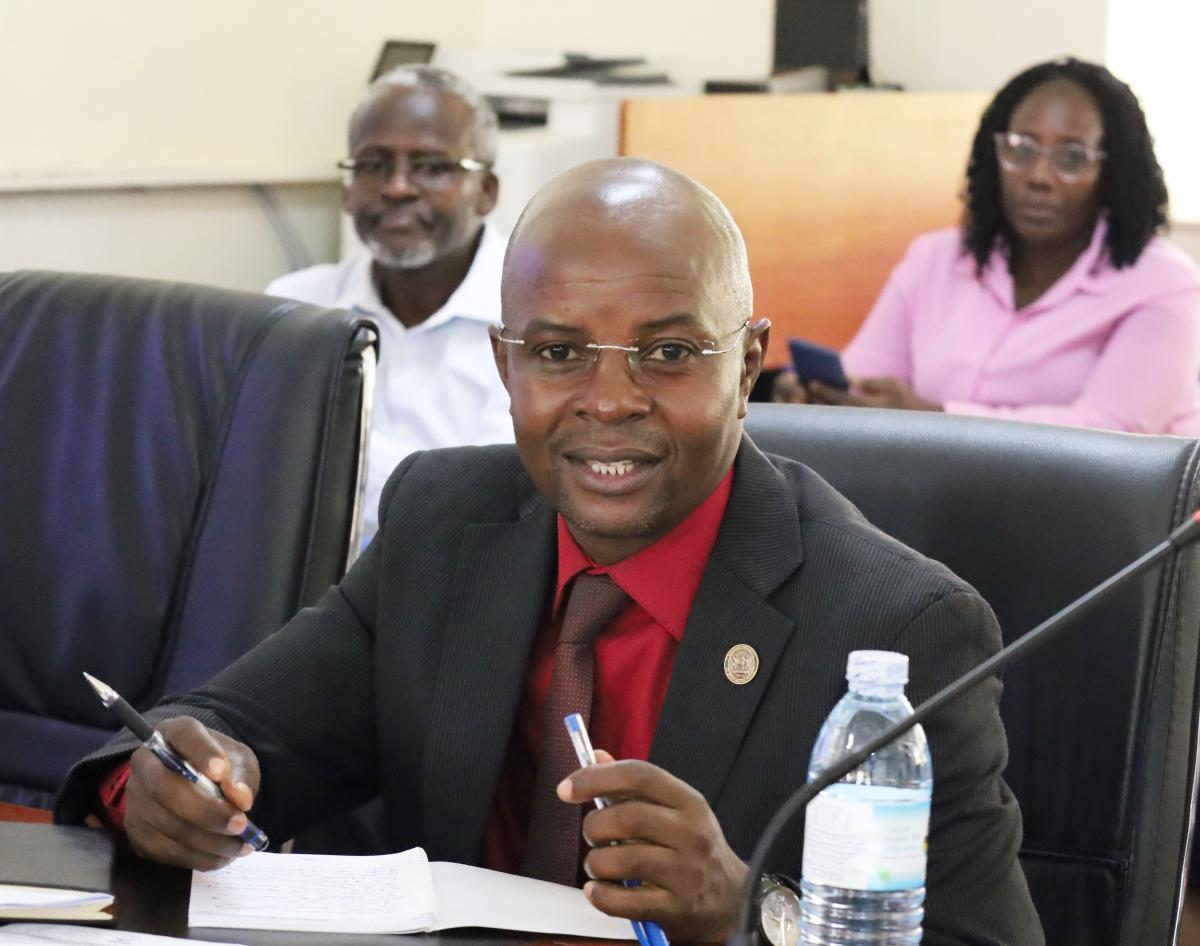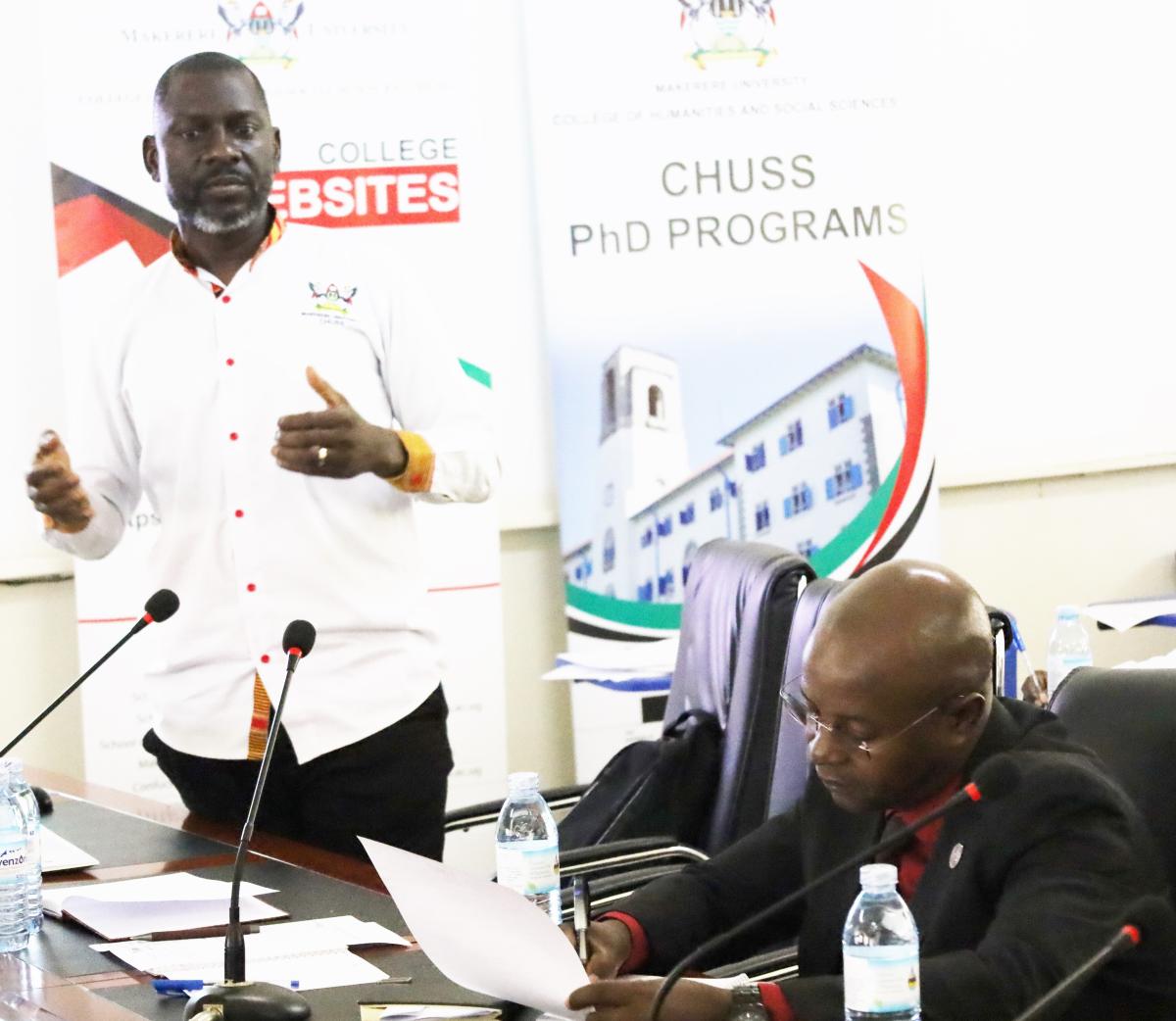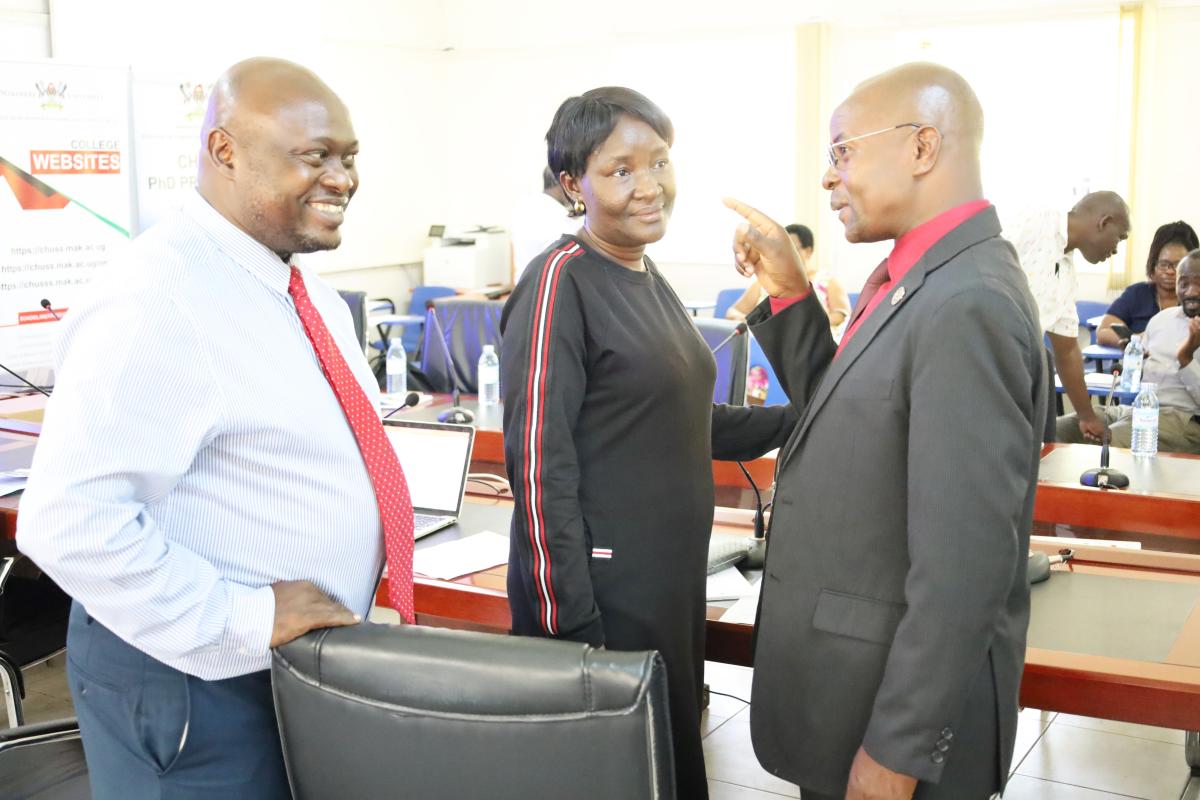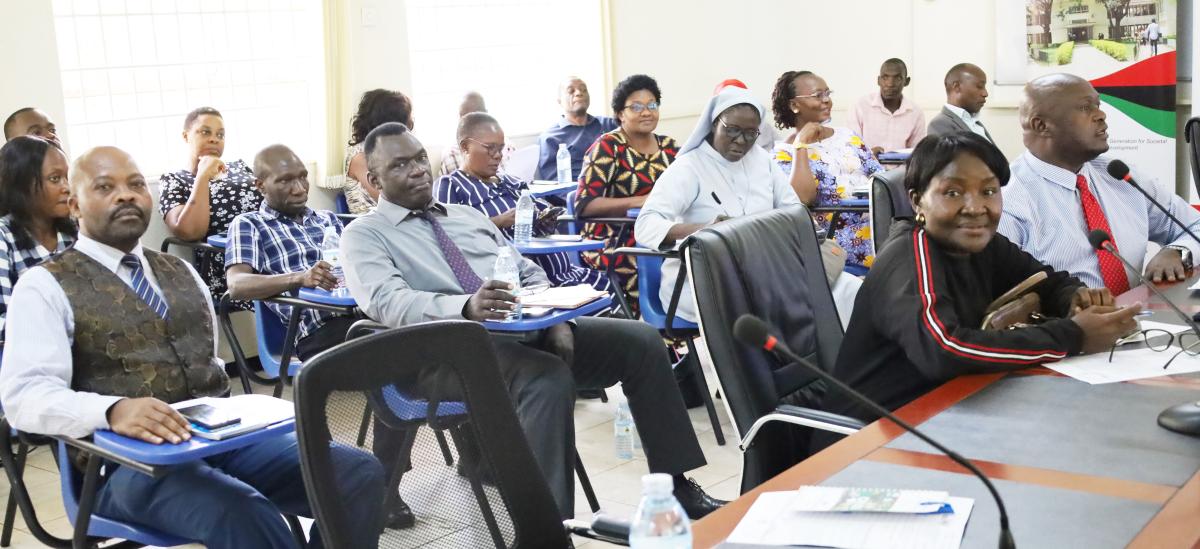
Officials from the Directorate of Graduate Research and Training (DGRT) on 7th March visited the College of Humanities and Social Sciences (CHUSS) to discuss strategies of enhancing the university’s capacity to increase the number and quality of PhD graduates.
CHUSS has been credited for presenting the highest number of PhD graduands in the last three consecutive graduation ceremonies with over 20 candidates representing 10% of the total university output.
The visit was a result of the issues that emerged during the recent Doctoral convention that was held at Hotel Africana where the Directorate was asked to come up with more concrete ways of engaging with colleges as the university strives to become research –led.
The team led by the new Director, Directorate of Research and Graduate Training Prof. Edward Bbaale wanted to understand CHUSS strategies for increasing graduate enrollment and how the college plans to uphold and sustain its upper hand in doctoral training.

Statistics show that the CHUSS great PhD harvest comes from sponsored candidates which according to DGRT is a risk. The Directorate wants a sustainability plan and a strategy of locally funded students so that if donors withdraw, the college does not collapse.
The team also wanted to learn and pick a leaf from CHUSS that will be a spring board when visiting other colleges for emulation as best practices.
The other reason for the visit was to hear the bottlenecks to graduate training and research which are solvable through existing policy and policy proposals which have many stages with different gates at the Board of Senate and Quality Assurance among others.
The meeting was attended by the college leadership including Principals, Deans, Heads of Departments, program coordinators at school and departmental levels, administrative and other staff who discussed how they would lead a better and more efficient management and delivery of graduate research and training in the college.
The discussions focused on strategies to increasing on graduate enrollment, sustainability plan for managing graduate education and research at a predominantly Graduate school with experiences from the CHUSS Cohort –based PhD.
Presenting the accreditation, enrolment, graduation and admission status of CHUSS programmes ,the Deputy Director, Graduate Research and Training Dr. Julius Kikooma said the Directorate is focusing on tracking and engaging with colleges on graduate programs.

“In terms of graduate output, CHUSS has two outstanding strength in terms of PhD and Post Graduate Diplomas. We are not bad in terms of numbers but If you can deliver the highest number of PhDs, you can deliver the highest number of master because you are more diverse and have the potential” , Dr. Kikooma implored schools to come up with strategies to increase output from struggling programmes.
The Director, Directorate of Research and Graduate Training Prof. Edward Bbaale stressed that Makerere is committed to transforming into a research led university and as a Directorate they are committed to that agenda.
Prof. Bbaale reported that during the Doctoral convention at Hotel African, the Vice Chancellor Prof. Barnabas Nawangwe urged colleges to commit on centering graduate training and research in reshaping the graduate education landscape at Makerere University.
The research led agenda according to the Director, has put the DGRT on the steering wheel, exposed them, saying they are bare and, must deliver to shine.
“What management is interested in, is that you need to be more innovative as units and individual faculty. Makerere is great because many units have doctoral faculty with capacity to supervise PhDs who have moved through different levels and are bound to contribute to the strategic agenda”, Prof. Bbale stressed adding that staff can work with other units and jointly develop programmes.
Prof. Bbaale explained that besides administering matters to do with graduate training, the DGRT is charged with responsibility of ensuring a conducive policy environment for training and research and initiating policy reviews and recommendations through relevant organs for change.
“We are here to hear from you because CHUSS is one of the colleges to pick lessons as far as doctoral training is concerned. Congratulations for the largest PhD harvests over the last three years.. it brings on table how to sustainably remain there and increase.
We are also here to understand the roadblocks to a great graduate training and research and those that can be identified and solved through policy changes and also to hear best practices for recommendations”. Prof.Bbaale explained
He said the DGRT is guided by the Board of Research and GraduateTraining which plays an oversight function, monitoring and evaluation to ensure compliance to standards with Senate as another guage. As DGRT, Bbaale said, they provide a coordination role and are dependent on colleges that run day to day programmes.
DGRT planned activities for the year
Prof. Bbaale reported that the Directorate is already engaged in policy reforms and wants to invest time and engage colleges in policy orientations. He added that THE Directorate wants to have a post-doctoral policy as a good potential for graduate programs and a turning point for publications. The proposals is that the university earmarks funds to sponsor candidates outside so that research outputs are owned by Makerere.
In addition, the Director reported that the Directorate wants to be deliberate and intentional on streamlining graduate admission where it has no end, but to be structured and run on cohort - based PhD. The idea is to admit in cohort and follow students’ milestones.
The Director also said, the Directorate was rethinking of the taught PhD but moving hand in hand with PhD by research, to have a structure and curriculum of what the candidate must do at the end of PhD.
Further, Prof.Bbaale said they are working on upgrading the Graduate Handbook and other policies.
Strategies for increasing Graduate enrolment at CHUSS
Representing the Principal CHUSS, the Deputy Principal Assoc. Prof. Eric Awich Ochen said the college established the project coordinating office and a graduate coordinator, an initiative that can be replicated to support the deputy principal, and, a contact point for graduate training in organizing seminars, answering students concerns, mentorship and supporting supervisors.

“This has helped control the drop outs and improve completion rates. Over the last six years, examinations of PhDs has improved and external examiners paid on time. 98% of examiners are happy, well-facilitated and the turn up of reports good at times within two weeks”. Dr. Awich said.
Dr. Awich said the CHUSS has strengthened and established a number of collaborations and attracted capacity building grants for research, graduate and Post Graduate training including Andrew Mellon and Gerda Henkel Foundations among others.
“We seek more opportunities for more cohort and PhD training as the best strategy to help students complete on time. As DGRT, there is need to help the university in identifying more partners”, Dr. Awich submitted.
At the national level, Dr. Awich said, the college works with the UPDF, Uganda Police and Prisons and has signed MoUs with the UPDF Senior Staff command plus over 25 other MoUs with local and international partners which presents an opportunity for Makerere to put its footprint.
To enhance the quality of scientific multi-disciplinary and multi-institutional research and scholarly writing and publications, Dr. Awich reported that the college established the Social Sciences Research Ethics Committee.
Dr. Awich added that the college graduate training and research has been strengthen by the nine centres and two research institutes that have been at the core of developing new and responsive PhD programmes and furthering partnerships and community outreach.
To increase the number of graduate fellows Dr. Awich proposed the need for the university to come up with a mechanism for fees waivers as a scholarship at departmental levels among others.
Experiences from the Cohort - based PhD Program
Speaking on behalf of the coordinators for the Andrew Mellon and Gerda Henkel funded PhD program, Dr. Pamela Kanakhwa explained that since 2015 the college has been receiving 10 students every year from all over Africa with funding from Andrew Mellon and Gerda Henkel foundations.
Gerda Henkel Foundation, is a humanitarian foundation based in Germany which, on the African continent has funded research and graduate students through Lisa Maskell fund since 2009 -2010 when they partnered with the University of Stellenbosch under a premiership program which was called Partnership for Africa's Next Generation of Academics (PANGeA).
PANGeA is a collaborative network of leading African universities developing research capacity and confidence in bringing African expertise to Africa's challenges. The universities involved in the PANGeA network are the University of Botswana, the University of Dar es Salaam in Tanzania, the University of Ghana, Makerere University, the University of Malawi, the University of Nairobi in Kenya, Stellenbosch University, and the University of Yaoundé I in Cameroon.
In a bid to diversify, in 2015 PANGeA got into contact with Prof Edward Kirumira who was the then chairperson PANGeA and Makerere University was added in November 2016.
Dr. Kanakhwa said the 1st cohort (2017) have all graduated with a PhD in humanities of Makerere University except one candidate who dropped out due to illness. In 2018, CHUSS admitted the 2nd cohort (10 students) and are in various stages of completion but was greatly affected by the pandemic. In 2019 the college had the 3rd cohort of 10 students, in 2020 another cohort of 8 students and the 2021 cohort that had 10 students.
Dr. Kanakhwa explained that admissions are intense and done once under compulsory signed agreements and an almanac strictly followed.
“The college organizes cross cutting courses, writing workshops, progress reporting, mentorship and retooling workshops.
We also introduced pre-application workshops for competitive grants to help students know what funding agencies look for and the post doc grants.”
In addition, the college organizes dissemination workshops through different fora for students to reflect on what they are doing, invite scholars who comment on their work.
The college also supports students by providing them funds for space in Mawazo and other journals.
“The college also organizes supervisors retooling workshops on practices which have worked. This brings on heads of departments, deans and members from university units to remind members on their roles and graduate policies and practices”, Dr. Kanakhwa stated.
Dr. Kanakhwa also said the college endeavors to find avenues for supporting graduate students who are not on scholarship by putting slots to sponsor say 3PhDs and a masters on a different program with emphasis on creating a conducive environment for students.
The cohort system according to Dr. Kanakhwa keeps the coordinators on love to look for partners and funding opportunities for students to sustain them and complete the program on time.
The Andrew Mellon and the Gerda Henkel support has made a community of scholars in the college and made CHUSS a vibrant intellectual community.By the end of this project, CHUSS would have educated about 60 PhD students.
The funding has also benefited the college in terms of infrastructure, contributed to the intellectual life and convened so far seven symposiums, the CHUSS Conversations and a number of seminars.
Discussions and proposals from the college
Members deliberated on the enablers and bottlenecks to research and graduate training, enhancing graduate supervision, selection of graduate students and challenges to graduate supervision
To increase the number and improve the quality of graduate training members proposed that the University makes a deliberate move to create space for graduate training, incentivize internal examination as extra load and allow CHUSS students from 2015 to be registered to complete.
It was proposed the university registers value in affiliations and treat them as opportunities, lobby government to support graduate training as this contributes to her vision and the National Development plans and address the staffing gaps.

Management was implored to think about prorata, staff welfare and salary enhancement across the divide, expedite staff promotion process, review the Human Resource manual attaching attraction of funding to promotion and postretirement contracts and put in place systems that bring in funds.
Members expressed the need for special training facilities for specific programs eg psychology clinic, musical theater , studios etc, having a deliberate policy to reduce the workload at the lower level of undergraduates, and, institute a budget for curriculum development and reviews to reduce reliance on donors.
In addition to revisiting PhD supervision equivalence to one supervision as a promotion requirement, members suggested that the two year contract should be revisited to allow more years to enable staff attract funding and to avoid losing faculty to other universities.
Members observed that there was need to initiate a policy for academic gain of being a head of department, dean etc, and the need to reduce the beauracracy for curriculum development and reviews and that the DGRT should engage with Senate, NCHE and facilitate the process.
Conclusions and issues to be taken forward.
The Deputy Director Assoc. Prof. Julius Kikooma appreciated members for raising pertinent issues and proposals adding that some of them are directed to management and the Chair Board of Research and Graduate Training while some were for the Directorate to pick.
Dr. Kikooma asserted that the Directorate considers the working conditions of staff and that is why they were on ground to pick the language and best practices for emulation.
He clarified that the Vice Chancellor is passionate about attracting funding for graduate training and has pledged to work with partners and engage government in a conversation.
“The Vice Chancellor was also committed to engage different partners to have a building for graduate school - a space that is characteristically for graduate students.
As a public institution governed by public service, increasing the staffing levels will depend on instructions from the relevant government organs”. Dr. Kikooma said
Kikooma added that the policy on PhD fellows is there and every department should have graduate fellows to redistribute the load, and its practicality and implementation can be dealt with
The Director DGRT Prof. Edward Bbaale said a lot had been noted for synthesis and the Directorate will come up with write-ups and engage where possible.
Prof. Bbaale explained that Government took over the wage bill of Makerere and all funds go to government and therefore not practical to have a percentage of PhD funds ploughed back to colleges.
“The college should budget for internal examination just like they did for external examination because motivation is critical and, incentive structures need to be correct.
The issue of undergraduates is no longer getting incentive to maintain. The idea is to gradually reduce undergraduate enrolment and increase graduate enrolment and therefore, there is no reason to hold the same number of undergraduates”, The Director explained.
